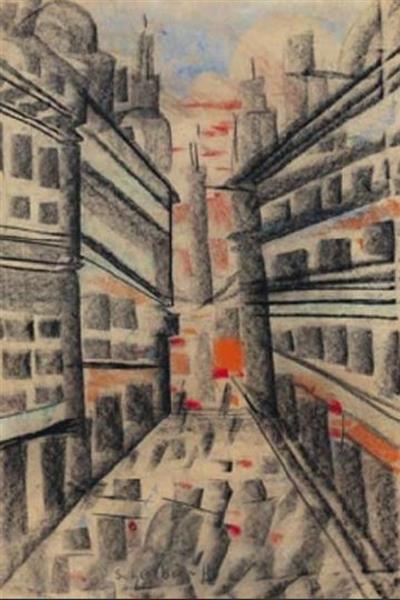Description
The "Metropolis" (Metropolisz) painting by Hugó Scheiber is a vibrant and dynamic evocation of urban life in the first half of the twentieth century. Scheiber, a Hungarian artist who was prominent in the avant -garde movement, captures in this work the essence of the modernity and bustle of the city, using a composition that challenges the traditional conventions of art.
The visual framework of "metropolis" is a lace of geometric shapes and energetic lines that intersect, suggesting both the structure of urban architecture and the incessant movement of its inhabitants and vehicles. The painting is characterized by an asymmetric and interconnected arrangement of elements, creating a visual flow that directs the viewer's gaze through various areas of activity, reminiscent of futurism and its emphasis on speed and dynamism.
The colors that Scheiber uses are equally striking and bold. Intense and contrasting tones predominate such as red, blue and black, which not only enhance the vivacity of the scene, but also provide a sense of urgency and frantic energy. This chromatic choice is deliberate and emphasizes the spirit of the urban environment, reflecting both the artificiality of the electric lights and the diversity and mixing of elements in constant movement.
One of the most notable characteristics of "metropolis" is the abstraction of human figures. Although the characters are present, they are represented extremely stylized and fragmented. Instead of detailed descriptions of people, Scheiber chooses to suggest human presence through silhouettes and forms that hint the daily hustle of a modern city. This approach allows the characters to be founded with the structure of the city itself, underlining the interdependence between the human being and its built environment.
Hugó Scheiber, whose work often reflected the chaos and beauty of European cities in transition, offers us with "metropolis" a unique and almost kinetic vision of the urban landscape. Belonging to a generation of artists influenced by expressionism, cubism and futurism, Scheiber finds a unique balance between representation and abstraction. His work is not so much a literal documentation of urban life, but an attempt to capture its essence, its rhythm and its pulse.
The "metropolis" painting is also inscribed in the tradition of urban representations of the early twentieth century, a period where the city and modern life constituted recurring themes for many artists. Compared to contemporary works such as Robert Delaunay with his series of "the simultaneous windows" or the urban landscapes of Italian futurists, Scheiber's work offers a more lyrical and less fragmented but equally shocking approach.
In conclusion, "Metropolis" by Hugó Scheiber not only invites us to contemplate urban life under a new light, but also reflects the ability of modern art to transform everyday experience into a visual symphony of colors and shapes. Through its ability to combine several styles and techniques, Scheiber manages to encapsulate the vitality and complexity of the metropolis, making this work an indispensable piece to understand the evolution of avant -garde art in Europe.
KUADROS ©, a famous paint on your wall.
Hand-made oil painting reproductions, with the quality of professional artists and the distinctive seal of KUADROS ©.
Art reproduction service with satisfaction guarantee. If you are not completely satisfied with the replica of your painting, we refund your money 100%.

